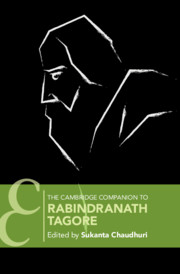Book contents
- Frontmatter
- Contents
- List of Illustrations
- Notes on Contributors
- Preface
- Note on Conventions and Practices
- 1 Rabindranath Tagore: From Art to Life
- 2 A Garland of Many Tagores
- Part I Overviews
- 3 Rabindranath and His Times
- 4 Tagore's Poetry: An Overview
- 5 ‘Something of a Musician’: Tagore's Songs
- 6 Rabindranath Tagore: Drama and Performance
- 7 Imagined Worlds: The Prose Fiction of Rabindranath Tagore
- 8 The English Writings: An Overview
- 9 Tagore and Indian Literature: Influence and Presence
- 10 Rabindranath Tagore and Literary Communication across Borders
- 11 Tagore and the Visual Arts
- Part II Studies
- List of Tagore's Works Cited, with Index
- Further Reading
- General Index
7 - Imagined Worlds: The Prose Fiction of Rabindranath Tagore
from Part I - Overviews
Published online by Cambridge University Press: 24 December 2019
- Frontmatter
- Contents
- List of Illustrations
- Notes on Contributors
- Preface
- Note on Conventions and Practices
- 1 Rabindranath Tagore: From Art to Life
- 2 A Garland of Many Tagores
- Part I Overviews
- 3 Rabindranath and His Times
- 4 Tagore's Poetry: An Overview
- 5 ‘Something of a Musician’: Tagore's Songs
- 6 Rabindranath Tagore: Drama and Performance
- 7 Imagined Worlds: The Prose Fiction of Rabindranath Tagore
- 8 The English Writings: An Overview
- 9 Tagore and Indian Literature: Influence and Presence
- 10 Rabindranath Tagore and Literary Communication across Borders
- 11 Tagore and the Visual Arts
- Part II Studies
- List of Tagore's Works Cited, with Index
- Further Reading
- General Index
Summary
In 1877, when he was just sixteen years old and had begun to compose the lyrics that would form part of Bhānusingha th kurer padābali (The Songs of Bhānusingha Thākur), Rabindranāth Tagore contributed two pieces of prose fiction to the family journal Bhārati, then edited by his eldest brother, Dwijendranāth. The first was a romantic short story, ‘Bhikhārini’ (The Beggar Woman), set in distant Kashmir; the second was the unfinished novel Karunā, twenty-seven chapters of which appeared in Bhārati before the young writer was sent away to Āhmed b d in 1878 to prepare for his journey to England. These very early examples of the two genres in which Rabindranath was later to make major contributions bear few marks of his genius. He was himself dismissive of the excess and artificiality of his youthful productions, and singled out Karunā in particular for its precocious display of bravado. Seven years later, however, he asked the essayist Chandranāth Basu for his opinion of this early novel, to which Chandranath returned a long review praising the work's conception, its comic brilliance, and its social analyses, but pointing out numerous structural flaws, as well as lapses in continuity, characterization, and style of treatment. Expectedly, Rabindranath did not permit either ‘Bhikhārini’ or Karunā to be reprinted in his lifetime. When he asked for Chandranath's comments, he had already completed another novel, this time a slender work of historical fiction, Bauthākurānir hāt (The Young Queen's Market, serialized 1881–2, published 1883). He continued this historical vein in Rājarshi (The Royal Sage, serialized 1885, published 1887).
None of these early narrative exercises would stand comparison with the fiction of his great nineteenth-century predecessor Bankimchandra Chattopādhyāy, whose extraordinary impact upon contemporary readers is memorably described in Tagore's Jibansmriti (Reminiscences). Recalling his own early reading, Rabindranath speaks of his ecstatic surrender to the island romance of Bernardin de Saint-Pierre's Paul et Virginie, with its images of remote, sea-girt coconut groves, encountered in Bengali translation in the journal Abodh-bandhu: this was soon matched by the magic of Bankim's evocation of the shadowy forest lining the riverbank in his novel Kapālkundalā.
- Type
- Chapter
- Information
- The Cambridge Companion to Rabindranath Tagore , pp. 131 - 157Publisher: Cambridge University PressPrint publication year: 2020



